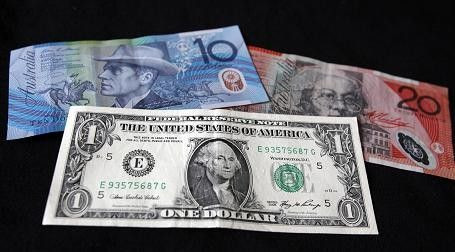Ron Paul - Is He Right About the U.S. Dollar, Inflation?
Analysis

So you're in the camp that still thinks 2012 Republican presidential candidate and U.S. Rep. Ron Paul, R-Texas, is right about inflation and the dollar?
Ron Paul contends that high inflation to hyper inflation, via the U.S. Federal Reserve's printing money, is up ahead Well, a point of clarification for Rep. Paul: The U.S. Federal Reserve doesn't print money -- the U.S. Treasury does; the Fed controls the monetary base.
Financial Crisis: Masssive Asset, Wealth Destruction
Paul conveniently talks about the Fed's monetary base, which has expanded, without talking about the massive -- and we mean massive -- monetary destruction as a result of the financial crisis and the reduction in U.S. stock, bond, housing values, and the lost income and wealth due to enormous job losses. And, oh, by the way -- there's been some asset destruction in Europe, too. No doubt Rep. Paul hasn't been publicizing too much the asset and wealth destruction that's occurred in Greece, Italy, Spain, Portugal and Ireland -- the Eurozone nations hardest hit by the financial crisis.
So what's happened regarding inflation? The U.S. consumer price index is up 3.4 percent in the past 12 months, and the core rate, which excludes the often-volatile food and energy component, is up 2.2 percent over the past year, since November 2011.
Hence, contrary to Paul's polemics and alarmist projections, inflation hasn't really increased that much; further, many economists will argue that the greater danger to the U.S., European, and Japanese economies remains deflation, not inflation.
Ron Paul doesn't talk about the deflation threat too much, because the facts relating to it do not fit his inflation predictions, but the objective reality of the deflation risk confirms Keynesian economics, not Paul's analysis.
The Dollar: Hanging In There
And how about the dollar? Despite the third straight year of $1 trillion U.S. budget deficits, and the U.S. Federal Reserve's unprecedented quantitative easing program (QE, QE II and Operation Twist) , the U.S. dollar, as measured by the dollar index, in the past year is...basically where it was at the start of 2011.
Also, since January 2011, the dollar is essentially unchanged versus the British pound ($1.5595 compared to $1.56.20 Friday), up about 2 percent versus the Canadian dollar (C99.46 cents to C$1.0195 Friday), and against its fiercest rival -- the euro -- the dollar has...weakened about 1 percent ($1.2910 to $1.3034).
True, the dollar was weakened substantially against Japan's yen, falling 6 percent (83.02 yen to 78.13 yen Friday), but unless you're willing to 'park' your money in Japan's banks for almost no return (Japan's interest rates are extremely low), the yen may not be an option for you. And, by extension, that same drive for yield/return will probably continue to discourage many institutional investors (IIs), as well, from trading in their dollars for yen.
What's more, if the dollar's resiliency in 2011 didn't surprise you enough, how's this one: there's a decent chance the dollar may rally -- rise in value versus other, major currencies -- in 2012. Here's why:
U.S. budget deficit reduction progress. First, believe it or not, progress reducing the budget deficit is likely. The automatic spending cuts required by the U.S. debt deal provide a strong incentive for both Democrats and Republicans to compromise in 2012 and strike a deal that avoids the draconian cuts to defense and social programs that will occur without a deal. True, 2012 is an election year, but a Democratic/GOP deal would enable the parties to spread the pain out a few more years -- something that is politically smart, as it will mean a smaller economic sacrifice by constituent groups. Analysis: Slightly dollar bullish.
Eurozone debt concerns. The European Union has made progress addressing it sovereign debt woes -- it's poised to increase the size of its bailout fund -- but at least two nations remain under 24-hour observation: Italy and Greece. Italy will probably need a larger bailout, and its unclear whether Greece's smaller economy will able to adequately service its debt, even with an EU bailout package in place. Each case study is bearish for the euro -- and that's likely to keep institutional investors' stance toward the euro subdued and guarded. Analysis: Slightly dollar bullish.
Dollar as global reserve currency. Globalization may lead to an economic system in which there are several reserve currencies, and to some degree the euro, yen, British pound, and Swiss franc, already play supporting roles, but institutional investors, for several reasons, still are not ready to abandon the dollar-dominated reserve currency system. The dollar's reserve currency status boosts its value. Analysis: Dollar bullish.
U.S. economic expansion. Finally, the U.S. economy, after the longest and most painful recession (2007-2009) since the Great Depression, will likely record better-than-expected GDP growth, perhaps higher than 2.7 percent, in 2012, and probably for longer. U.S.-based companies, including many multi-national corporations, are lean, cash-flush -- they're sitting on roughly $2 trillion in cash -- and well-positioned to take advantage of both improved U.S. commerce conditions, and stronger growth rates in emerging markets. That bodes well for earnings growth, and because these are dollar-denominated investments, it will increase demand for dollars. Analysis: Dollar bullish.
2012 Forecast: Slightly Dollar Bullish
So whether you're talking about U.S. deficit reduction, Europe's debt woes, currency reserves, or the multi-national corporation-led U.S. economic recovery, key fundamentals suggest a better year for the dollar in 2012 amid moderate inflation conditions.
Of course, the unexpected can always occur: the U.S. could become involved in another war, an unforeseen natural or man-made calamity (such as terrorism), or a major and sustained disruption in the flow of imported oil to the U.S. could happen, and all would put downward pressure on the dollar, but absent the above, look for the dollar to trend higher in 2012.
--
© Copyright IBTimes 2024. All rights reserved.





















